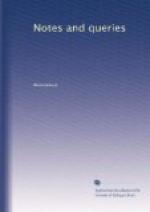“Le vice rend hommage a la vertu en s’honorant de sus apparences.”
J.B.M.
Feb. 5. 1850.
Shipster.—A scip-steora among our Anglo-Saxon ancestors was a pilot ("ship-steerer"). The word has descended to our own times in the surname of the family Shipster. As a common noun it was not obsolete in the days of Wynkyn de Worde, who printed that curious production “Cock Lorelle’s Bote,” one line of which runs thus:—
“With gogle-eyed Tomson, shepster of Lyn.”
It is pretty certain, however, that this masculine occupation was not the one followed by “Marie Fraunceys de Suthwerk!”
Pray accept this “Reply” for what it is worth. Perhaps I might have done better by meeting Mr. John R. Fox’s “Query” (No. 14. p. 216.) with another. Should not the designation of Marie F. be Spinster instead of Shipster?
MARK ANTONY LOWER.
Lewes, Feb. 2.
Sparse.—Permit me to refer your correspondent “C. FORBES” for a reply to his query, p. 215. of your last Number, to the article “Americanism” in the Penny Cyclopaedia, the author of which observes:—
“Sparse is, for any thing we know, a new word, and well applied; the Americans say a sparse instead of a scattered population; and we think the term has a more precise meaning than scattered, and is the proper correlative of dense.”
In the Imperial Dictionary (avowedly based upon Webster’s American work, which I cannot at this moment refer to in its original form), the word in question is given both as an adjective and as a verb, and the derivatives “sparsed,” “sparsedly,” “sparsely,” and “sparseness,” are also admitted. The reference given for the origin of “sparse” is to the Latin “sparsus, scattered, from spargo;” and the definitions are, 1. “Thinly scattered, set or planted here and there; as, a sparse population:” and, 2., as a botanical term, “not opposite, not alternate, nor in any regular order; applied to branches, leaves, peduncles, &c.”
J.T. STANESBY.
Cosmopolis—Complutensian Polyglot.—Though in considerable haste, I must send replies to the fourth and eighth queries of my friend Mr. Jebb, No. 14. p. 213.
Cosmopolis was certainly Amsterdam. That the Interpretationes paradoxae quatuor Evangeliorum, by Christophorus Christophori Sandius, were there printed, appears from this writer’s Bibliotheca Anti-Trinitarionum, p. 169., Freistad, 1684. I may add that “Coloniae” signifies “Amstelaedami” in the title-page of Sandius’s Nucleus Historiae Ecclesiasticae, 1676, and in the Appendix Addendorum, 1678, 4to.
With regard to the MSS. used in the formation of the text of the Complutensian Polyglot, Mr. Jebb will find an account of their discovery in a letter addressed by Dr. James Thompson to the editor of The Biblical Review. See also The Irish Ecclesiastical Journal for April 1847.




